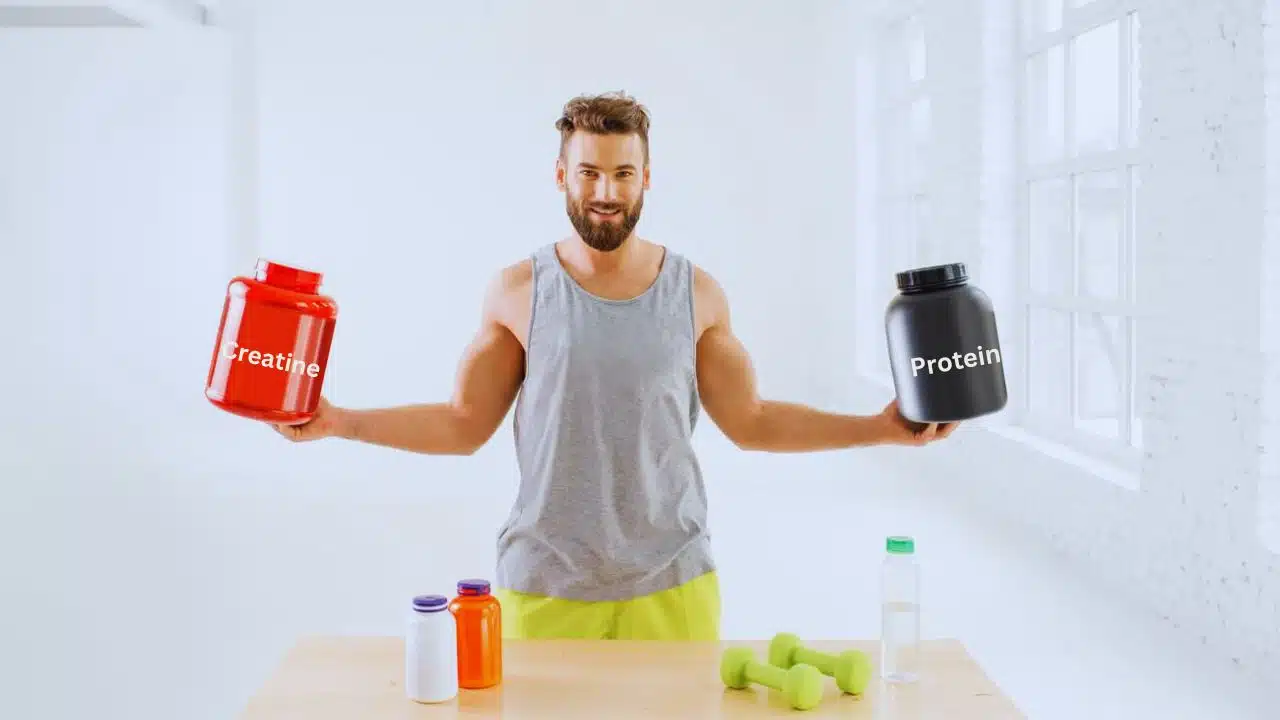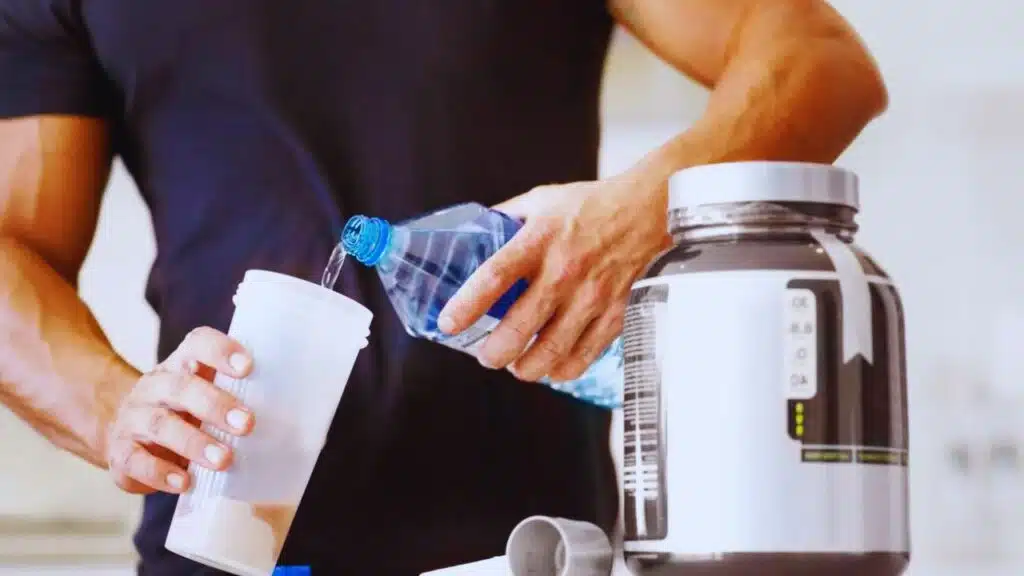In the fitness and athletic performance world, supplementation has become a key component for those seeking to maximize their results. Among the vast array of supplements available, creatine and protein powder are two of the most popular and effective options.
Both are widely used by athletes, bodybuilders, and fitness enthusiasts to enhance muscle recovery, boost exercise performance, and support overall muscle growth. However, determining which supplement is more beneficial for your needs can be challenging.
This article delves into the differences between creatine and protein, examining their unique benefits, optimal usage, and how they can be combined to achieve the best possible results in your training regimen.
Whether you aim to build muscle, improve strength, or enhance recovery, understanding the roles of creatine and protein can help you make informed decisions and optimize your supplementation strategy.
Understanding Creatine and Protein
Creatine
Creatine is an amino acid naturally found in muscles and produced from the amino acids arginine, glycine, and methionine. It is critical in energy production, particularly during high-intensity, short-duration exercises like weightlifting and sprinting.
Creatine helps produce adenosine triphosphate (ATP), an energy-storing compound that fuels muscle contractions. This amino acid can also be obtained from dietary sources such as red meat and fish or through various supplements like creatine monohydrate, creatine citrate, and creatine hydrochloride.
The most commonly used form is creatine monohydrate, which has been extensively studied and proven effective. When taken as a supplement, creatine increases the phosphocreatine stores in muscles, providing a quick source of ATP during high-intensity activities.
This helps improve performance, increase strength, and support muscle growth. Additionally, creatine can enhance the body’s ability to produce energy rapidly, making it particularly beneficial for athletes engaged in explosive movements and intense workouts.
Protein
Protein is a macronutrient essential for muscle growth, repair, and overall development. It is composed of long chains of amino acids, which are the building blocks of muscle tissue. Dietary protein sources include meat, eggs, seafood, beans, peas, lentils, nuts, seeds, and soy products.
Protein supplements, often available in powder form, provide a convenient way to boost protein intake, especially post-workout. Types of protein powder include whey, casein, egg, soy, pea, hemp, and brown rice protein.
Whey protein derived from milk is viral due to its high biological value and rapid absorption rate. It contains all the essential amino acids required for muscle repair and growth, making it an ideal post-workout supplement.
Casein, another milk-derived protein, digests more slowly, providing a steady release of amino acids over several hours. This makes it suitable for consumption before bed to support overnight muscle repair.
Plant-based proteins, such as peas and hemp, are excellent alternatives for those who are lactose intolerant or prefer a vegan diet. These proteins provide a complete amino acid profile, supporting muscle growth and recovery.
Benefits of Creatine and Protein Powder
Creatine
Creatine offers several benefits for athletes and fitness enthusiasts. One of the primary advantages is its ability to increase lean muscle mass. Research indicates that creatine supplementation can significantly increase lean muscle mass when combined with resistance training.
It helps muscle cells retain water, making muscles appear larger and more defined. Additionally, creatine enhances exercise performance by providing a rapid energy source, improving strength, and reducing fatigue.
This is particularly beneficial for high-intensity, short-duration activities, such as weightlifting, sprinting, and high-intensity interval training (HIIT). Creatine boosts energy production by replenishing ATP stores, allowing for improved strength and performance.
Furthermore, creatine helps reduce muscle fatigue and accelerates recovery after intense workouts by replenishing ATP levels and reducing lactic acid buildup.
Studies suggest that creatine may have neuroprotective properties and improve cognitive function, particularly in individuals with conditions marked by brain creatine deficiencies, such as Alzheimer’s or depression.
By attracting water into muscle cells, creatine enhances muscle volume and can contribute to muscle growth. Moreover, by aiding in the replenishment of ATP, creatine helps reduce the sensation of fatigue during and after high-intensity workouts, allowing for longer and more intense training sessions.
Protein
Protein is crucial for muscle recovery and growth, supporting various physiological processes. It is essential for muscle protein synthesis and repairing and building muscle fibers damaged during exercise.
Consuming protein post-workout aids in faster recovery and muscle growth. Protein supplements offer a quick and easy way to meet daily protein needs, especially for individuals with busy schedules or higher protein requirements due to regular physical activity.
Protein powders often contain all nine essential amino acids, which the body cannot produce independently and must be obtained through diet. These essential amino acids are vital for muscle repair and growth.
Additionally, protein supplements support the immune system by providing amino acids and nutrients necessary for immune function. They also help regulate hunger by reducing the hunger-inducing hormone ghrelin and increasing appetite-reducing peptides, aiding in weight management.
Furthermore, the higher thermic effect of protein means it requires more energy to digest, helping boost overall metabolism. Protein helps maintain a positive nitrogen balance, crucial for muscle growth and repair.
It also provides a convenient and efficient way to ensure adequate protein intake, especially for those struggling to consume enough protein through whole foods alone.
Choosing Between Creatine and Protein for Muscle Gain
Creatine
Creatine is best suited for athletes and fitness enthusiasts engaged in high-intensity, short-duration exercises. It enhances performance by providing a rapid energy source, improving strength, and reducing fatigue.
Studies have shown that creatine supplementation can significantly increase lean body mass and exercise capacity, making it an excellent choice for those looking to boost their power and performance during workouts.
Additionally, creatine has been shown to improve recovery times and reduce muscle soreness, allowing for more frequent and practical training sessions. Creatine is particularly beneficial for individuals involved in explosive sports and activities that require short bursts of energy, such as sprinting, weightlifting, and high-intensity interval training (HIIT).
It helps increase the availability of phosphocreatine, which is essential for the rapid regeneration of ATP, the primary energy currency of the cell. By enhancing the body’s ability to produce ATP quickly, creatine enables athletes to perform at higher intensities for longer durations.
Moreover, creatine has been shown to improve muscle hydration, enhance muscle fullness, and reduce the risk of dehydration during intense exercise.
Protein
Protein supplements are essential for muscle recovery and growth. They provide the necessary amino acids to repair muscle tissues and promote protein synthesis. Regular protein intake is crucial for maintaining and building muscle mass, especially with resistance training.
Protein supplements benefit individuals who struggle to meet their daily protein requirements through diet alone. They also help maintain a positive nitrogen balance, crucial for muscle growth and repair. Protein supplements, such as whey protein, are quickly absorbed and provide a convenient way to ensure adequate protein intake, especially post-workout.
Whey protein is particularly adequate in stimulating muscle protein synthesis due to its high content of leucine, an essential amino acid that plays a crucial role in muscle growth.
Consuming protein immediately after exercise provides the muscles with the necessary building blocks to repair and grow, enhancing recovery and promoting muscle hypertrophy.
Additionally, protein supplements can be used as meal replacements or snacks to help meet daily protein requirements and support overall health and fitness goals.
Optimal Dosage and Timing
Creatine Dosage
The optimal creatine dosage depends on the individual’s goals and training regimen. Typically, a loading phase is recommended to saturate muscle creatine stores quickly. This involves taking 20 grams of creatine daily, divided into four doses, for the first 5-7 days.
After the loading phase, a maintenance dose of 3-5 grams per day is sufficient to maintain elevated muscle creatine levels. This maintenance dose can be taken at any time of the day, although some studies suggest post-workout ingestion may offer additional benefits.
It is important to note that while the loading phase can accelerate the saturation of muscle creatine stores, it is not necessary for everyone. Individuals who prefer a more gradual approach can take the maintenance dose from the start, which will still lead to full saturation over time, albeit at a slower rate.
Consuming creatine with a carbohydrate source is also advisable, as this can enhance its absorption and uptake by the muscles. Staying adequately hydrated is crucial when taking creatine, as it increases water retention in muscle cells.
Protein Dosage
The recommended dietary allowance (RDA) for protein is 0.8 grams per kilogram of body weight per day. However, the requirement can increase to 1.5-2 times the RDA for those engaged in regular exercise.
Consuming 20-25 grams of protein immediately after exercise can maximize muscle protein synthesis and support recovery. This can be achieved through protein shakes, protein-rich meals, or both.
It is also beneficial to distribute protein intake evenly throughout the day to ensure a steady supply of amino acids for muscle repair and growth. For individuals looking to build muscle, consuming protein at regular intervals, such as every 3-4 hours, can help optimize muscle protein synthesis.
It is crucial to choose high-quality protein sources that provide all essential amino acids, such as whey protein, known for its rapid digestion and high leucine content.
Additionally, protein before bed can support overnight muscle repair and recovery as the body continues to repair and build muscle tissue during sleep.
Combining Creatine and Protein
Many athletes and fitness enthusiasts use creatine and protein supplements for optimal results. Creatine enhances workout performance and recovery, while protein aids in muscle repair and growth.
Using both can provide comprehensive support for muscle development and overall athletic performance. Combining these supplements can help you maximize your gains by ensuring that your muscles have the energy needed for intense workouts and the building blocks required for repair and growth.
For convenience, consider adding creatine to your post-workout protein shake. This can simplify your supplementation routine and ensure you don’t miss a dose. By combining creatine and protein, you can take advantage of the synergistic effects of these supplements, enhancing.
Your performance and recovery. Creatine provides the immediate energy needed for high-intensity workouts, while protein supports long-term muscle growth and repair. They create a powerful combination that can help you achieve your fitness goals more effectively.
Summary
Creatine and protein supplements each offer benefits that can enhance performance. Creatine is most effective for high-intensity, short-duration exercises, providing rapid energy and aiding recovery.
Protein is essential for muscle growth and repair, making it vital for anyone looking to build or maintain muscle mass. Consider your specific fitness goals and training regimen when deciding which supplement to use.
For best results, incorporating both creatine and protein into your routine can provide a balanced approach to improving performance and achieving muscle gains. Always consult a healthcare professional or a registered dietitian before starting any new supplement regimen.
Understanding the unique benefits and functions of creatine and protein can help you make informed decisions about your supplementation strategy.
Incorporating these supplements into your routine can enhance your performance, support muscle growth, and achieve your fitness goals more effectively.







































